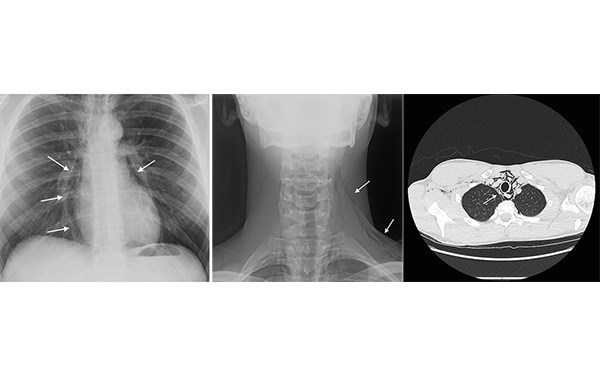Spontaneous pneumomediastinum is a rare clinical entity defined as the presence of free air in the mediastinal structures without an apparent cause such as trauma.
Case Report
A 21-year-old male presents to the emergency department with one day of neck discomfort and right-sided pleuritic chest pain. The patient had been celebrating the victory of a local sports team by screaming outdoors for several hours, at which point he had the sudden onset of an uncomfortable sensation in his neck and chest. He denies trauma, tobacco or recreational drug use, repeated episodes of vomiting, recent illnesses, or a history of lung disease. His examination is notable for crepitus along the lateral neck and a faint “crunching” sound heard on cardiac auscultation.
Discussion
Spontaneous pneumoediastinum, also known as Hamman’s Syndrome, occurs when air leaks through the alveolar structures and dissects back through the bronchovascular sheath and into the mediastinum. The most common causes include exacerbations of chronic lung diseases and lower respiratory tract infections, but repeated Valsalva maneuvers (such as coughing or screaming) and the inhalation of helium gases or drugs are less common etiologies.
Patients typically present with chest and neck pain, dyspnea, and a dry cough. Common exam findings include subcutaneous air in the neck and a crunching sound heard over the precordium, also known as Hamman’s Sign.
Most patients without underlying lung disease and uncomplicated spontaneous pneumomediastinum do well with conservative management.
Conclusion
Our patient was ultimately discharged home with plans to follow-up in one week for resolution of symptoms.



